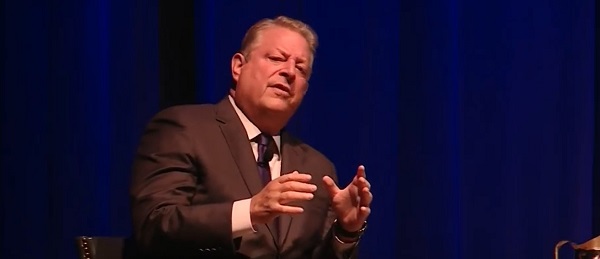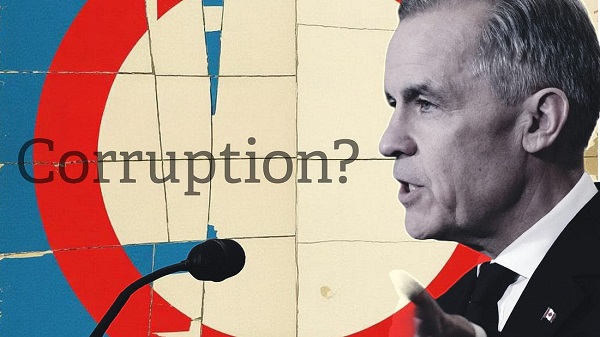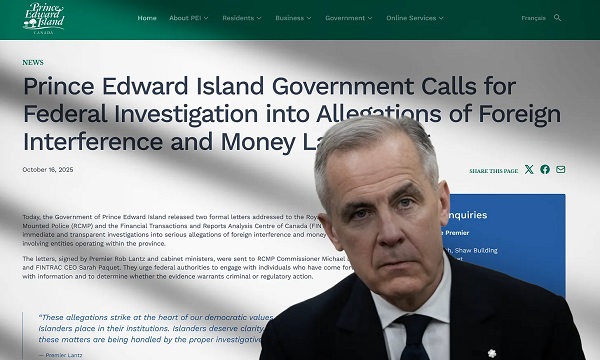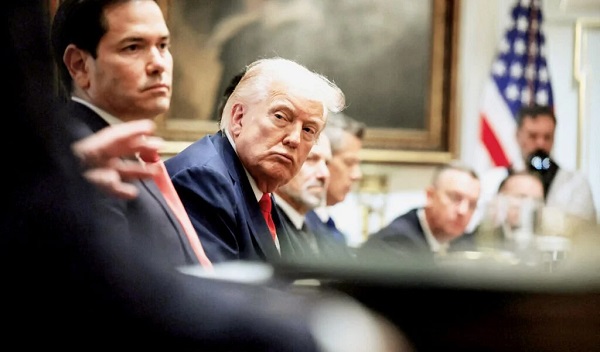Business
Al Gore Attempts To Keep The Sinking Climate Crisis Ship Afloat


From the Daily Caller News Foundation
By David Blackmon
“When something is unsustainable, it eventually stops,” former Vice President Al Gore said in an op/ed published by The Wall Street Journal. Given recent events, one might think Gore was referring to the ruinously costly attempts by governments of the Western world to force an energy transition via trillions of debt-funded dollars in subsidies for unreliable, intermittent energy sources like wind, solar and green hydrogen.
It has become obvious to most in the energy business now that the stick-and-carrot approach to a forced transition implemented by the Biden administration is not just unsustainable but a colossal failure. The stick of heavy-handed regulations and mandates combined with the carrot of economically ruinous government subsidies has resulted in a massive uptick in the national debt along with a playing field littered with dozens of bankruptcies by both startups and pre-existing green energy companies alike. Collectively, their waste of federal dollars makes the Obama-era Solyndra failure look like pocket change.
As critics of the Biden Green New Deal suite of policy choices repeatedly warned, the rent-seeking industries that became the chosen clients of the Democratic Party over the last four years – wind, solar, electric vehicles and green hydrogen – cannot displace fossil fuels in any scalable sense because the laws of physics don’t allow it. Too many companies in these industries also cannot be sustained for more than short periods of time without constant new injections of additional government subsidies, all of which in the U.S. have the impact of increasing the national debt.
When the Orwellian-named Inflation Reduction Act passed on party line votes in congress in 2022, I and others warned that the Democrats in congress and the Biden White House viewed the bill as just an initial down payment on their long-term goals. A steady succession of new IRA-type debt-funded bills would be required in the coming decades to sustain the transition, and without those added tranches of trillions of dollars in additional subsidies, most startups in those non-competitive energy businesses would ultimately fail. It wasn’t hard to see this coming.
In his op/ed, Gore writes all this financial carnage off with his typical climate alarm fearmongering, saying things like “treating the transition to a sustainable economy as optional isn’t an option,” and “the cost of inaction is indefensible and unbearable.” To which the only proper response is to ask Gore to tell that to all the lower income Americans who have seen their utility bills and food prices inflate to unbearable levels as they have borne the brunt of the inevitable outcome of the policies Gore, Biden and their cronies have happily forced onto the public. It’s one of the greatest transfers of wealth from the poor to the wealthy in global history. If you want an example of unsustainability, there it is.
Most hilariously, Gore states that “in the U.S., the fossil-fuel industry, its allies and captive policymakers seek to punish companies and investors pursuing sustainability goals with frivolous lawsuits, smear campaigns and the withdrawal of state-controlled funds under management.” Holy smokes, talk about a prime example of Clintonian projection, there it is.
No industry has been subjected to a decades-long constant stream of frivolous lawsuits and smear campaigns from critics quite like the coal and oil and gas industries have sustained in modern times. Right now, today, the oil industry is spending hundreds of millions of dollars defending itself against a well-organized lawfare campaign in which left-wing law firms recruit friendly, mostly-Democrat officials in cities, counties and states around the country to file frivolous lawsuits claiming billions of dollars in unsubstantiated damages related to climate change theoretically caused by emissions coming mainly from China. That is the very definition of a frivolous smear campaign and lawfare campaign rolled into one.
But it is Gore’s complaint about the effort by the Trump administration to implement a “withdrawal of state-controlled funds under management” that really takes the cake here. Apparently, this former vice president believes that elections really don’t matter at all.
But elections do matter, policies can change and billions of dollars in funds awarded to political cronies of one president can indeed be clawed back by another. Gore can rage against these winds of change all he likes, but that is American democracy in action.
David Blackmon is an energy writer and consultant based in Texas. He spent 40 years in the oil and gas business, where he specialized in public policy and communications.
Business
Ethics on Ice: See You Next Year

Democracy Watch reveals the Prime Minister’s ethics firewall is riddled with loopholes—while the Privy Council delays access to records that could expose just how deep the conflicts run
Ottawa’s most creative writers don’t work at the CBC. They work at the Privy Council Office, where “transparency” now means grabbing a lawful deadline by the collar and hurling it four months down the road. According to Democracy Watch’s October 16 press release, the PCO was legally required to respond by September 25 to an Access to Information request filed August 28. What did the request ask for? National secrets? State security files? No—it asked for basic stats and documentation about Prime Minister Mark Carney’s so-called ethics “screens.”
Read the full press release here
Specifically:
- The date his personal screens came into force
- The identities of those enforcing them
- The number of decisions flagged for review
- And how many times Carney recused himself from Cabinet discussions
You’d think if those screens were doing anything meaningful, the answers would be simple—ready to go. But instead of complying with the deadline, the PCO told Democracy Watch they now need until January 25, 2026 to respond. Why? They claim they need to conduct a “consultation.” Over what? No private info was requested, no corporate secrets, no personal data—just raw numbers and public official names the PCO has on hand every single day if the screens are actually being enforced.
Here’s the con: Mark Carney straps on an “ethics screen,” gives the cameras his best global finance smirk, and strolls right back into the room. Why can he do that? Because in Ottawa’s broken ethics law, there’s a magical phrase that turns a real, direct financial conflict into a non-issue with a single bureaucratic flourish. That phrase is: “general in application.”
As Democracy Watch lays out in their October 16 press release, this loophole isn’t just a flaw in the system—it is the system. The federal Conflict of Interest Act says that if a government decision affects a broad class of people or entities, then it doesn’t count as a “private interest,” even if it directly benefits a company the Prime Minister owns shares in. That’s right. If the impact is spread out enough—if the policy touches lots of players—Carney can stay at the table, vote, advise, shape, and spin, even if his own investments stand to gain.
Democracy Watch calls this out as part of what they’ve labeled the “dirty dozen” loopholes—12 major escape hatches in Canada’s ethics laws that allow top officials to profit while pretending to recuse themselves. And this one is the crown jewel. It essentially allows the Prime Minister to participate in nearly every federal decision—from regulatory changes to tax policies to infrastructure contracts—even if his private holdings are directly tied to the outcome.
And make no mistake: Carney’s holdings are not theoretical. According to Democracy Watch, he’s invested in over 550 companies, including a huge financial stake in Brookfield Corporation and Brookfield Asset Management, where he previously held senior roles. His so-called “blind trust”? Not blind at all. He picked the trustee. He knows what’s in it. He can give instructions like “don’t sell,” and he still holds stock options he can’t divest for years. So yes, he knows exactly what he stands to gain.
But thanks to the “general in application” clause, Carney can sit in on policies that steer money toward sectors he’s tied to, influence regulatory landscapes that shape Brookfield’s future, and greenlight decisions that send his portfolio climbing—all while claiming he’s acting ethically because it affects “everyone.”
It’s the most cynical kind of legal gymnastics. And as Democracy Watch rightly points out, it makes the ethics “screen” nothing more than a smokescreen—a PR tool to assure Canadians their Prime Minister is above reproach, while the mechanics of power still tilt in his financial favor.
This isn’t conflict of interest prevention—it’s institutionalized denial. It’s Ottawa’s version of “these aren’t the droids you’re looking for.” Wave the hand, invoke the clause, and suddenly there is no conflict, even when the money trail says otherwise.
You can smell the boardroom cologne from here. The man spent years in the C-suite orbit, and now we’re told that a couple of screens and a “blind trust” will purify the air. Blind? Don’t insult the country. He knows what he put in it, picked the trustee, can give instructions, and—minor detail—still sits on stock options he can’t sell for years. That’s not blind; that’s a portfolio with push notifications.
Meanwhile, the screens perform their real function: hiding recusals. The law says public declarations are required when you step aside. The workaround says, “Nah, just put up a screen and pretend it’s automatic.” It’s ethics by decorative throw pillow, looks tasteful, does nothing.
And when Democracy Watch asks for the most basic receipts—start date, who enforces, how many flags, how many recusals—the PCO collapses onto the nearest fainting couch like a silent-film star. “Oh dear, a request… for numbers?” Numbers! The scandal. Spare us. This isn’t decrypting alien radio; it’s checking a ledger. If the tally weren’t humiliating, they’d punch it into a calculator, hit “equals,” and email it before their Tim Horton’s muffins cool at the morning briefing.
Let’s be adults: if this “screen” actually had teeth, they’d mount the skulls on the wall. We’d get glossy dashboards, color-coded bar charts, triumphal pressers—“Look at all the times the PM bravely recused himself!” Instead, we get a bureaucratic calendar punt past Christmas. Why? So the Prime Minister can keep cosplaying as “arm’s length” while still grazing every file that moves a share price.
And the choreography is always the same: stall, euphemize, declare victory. First the delay, then the jargon—“consultations,” “processing,” “complexity”—all to avoid admitting the obvious: either the screen caught almost nothing, or what it caught is too awkward to show you. If this thing had bite marks, we’d see them. Instead, we’re told to admire the muzzle while the dog keeps chewing the furniture.
And that’s the point, isn’t it? The so-called “ethics screen” isn’t a safeguard—it’s set dressing. It’s the cardboard scenery they roll out behind the Prime Minister every time someone asks about his investments. The whole thing’s a pantomime of virtue. The script says “public service,” but the plot twist is always the same: self-service.
And look at how allergic this government is to sunlight. Democracy Watch’s request gets punted to January, and now our own request—for the same basic documents—gets quietly shoved down the road to June. June! Past the next controversy, past the next budget, probably past the next scandal. It’s the oldest Ottawa trick: when the fire’s burning, move the deadline to when everyone’s forgotten the smoke.
Here’s the ugly truth: every day this file sits buried in the government’s filing cabinet of shame, the Prime Minister keeps right on shaping policies that could pump up the value of the very companies he’s tied to. He’s not waiting for the ethics commissioner; he’s waiting for the news cycle to move on. And while the bureaucrats “consult,” he’s still in the room, still making calls that ripple through the markets.
And every delay, every “extension,” every smug little shrug from the Privy Council Office is another giant, flashing neon sign that says: “We think you’re stupid. We think you’ll forget.” They’re counting on it. They’re betting you’re too busy, too distracted, too demoralized to notice while they drag this thing past winter, past spring, right into a bureaucratic black hole where inconvenient truths go to die.
And the state broadcaster? The CBC won’t touch this with a ten-foot carbon-neutral pole. Not while it risks putting their favorite global finance guru in a bad light. You won’t see a Fifth Estate exposé, no stern voiceovers about conflicts of interest, no dramatic music. But guess what? I’m following it. I’m not letting it go. Because this isn’t a paperwork mix-up. This is a full-scale cover operation dressed up as “consultation.” And if they’re hiding the numbers, it’s because the numbers are bad.
Because here’s what’s really going on: the people writing the rules are also holding the shares. They’re voting in Cabinet while their investments sit in the exact sectors they’re regulating. They’re shaping fiscal policy while their portfolios quietly hum in the background. That’s not democracy. That’s not public service. That’s a rigged casino where the dealer already knows which cards are coming.
And the longer these records stay buried, the more obvious it gets. If this ethics screen was real, they’d have shown it to you already. If the Prime Minister was actually recusing himself, the list would be public. But it’s not. Instead, they’ve given themselves months—into NEXT YEAR—to keep this locked away, far past the next scandal, long after the press loses interest.
Let me be absolutely clear: the Prime Minister is could be profiting from the very policies he’s enacting, and no one in Ottawa wants to talk about it. That should enrage you. Because if the guy running the country is making money off your mortgage rates, your tax dollars, your energy bills—while hiding behind an ethics “screen” so flimsy it might as well be cling wrap—that’s not just unethical, it’s corrupt. And every Canadian deserves to know.
For the full experience, upgrade your subscription.
Business
Canada has an energy edge, why won’t Ottawa use it?

Energy abundance, properly managed, isn’t just Canada’s strategic edge—it’s our ace in the hole while allies scramble to rearm their energy systems and competitors sprint ahead. We can keep sleepwalking through the annual ritual of self-imposed shackles, watching golden opportunities slip through our fingers, or we can finally show up as a serious player in the energy security game we’re already knee-deep in.
What the public doesn’t see behind all the climate summit fanfare is a carefully choreographed performance where capitals everywhere scramble to perfect their lines for the UN’s annual pageant. COP30 descends on Brazil in mid-November, and once again Ottawa looks primed to arrive clutching a stack of promises, desperately hoping that thunderous applause will somehow count as tangible progress in the real world.
Thanks to years of bureaucratic capture, our government keeps churning out the measures most fervently demanded by the climate lobby, and this ritual proceeds as if “net zero” were still a credible roadmap rather than a marketing slogan stretched so transparently thin it’s practically see-through. But out in the real world—away from the theatrical staging—the energy system keeps issuing updates of its own that no amount of wishful thinking can erase. The question this year cannot be what flashy new prohibition Ottawa can unveil on cue: are our leaders finally prepared to read the room? Away from the virtue-signalling theatre, countries are quietly adjusting to immovable realities: demand keeps climbing, reliability actually matters, and security trumps sermonizing—and we should be looking south to see what’s really working.
From 2005 to 2023, U.S. per-capita CO₂ emissions from energy plummeted by nearly a third. Not because of performative pledges or green grandstanding, but because coal quietly gave way to natural gas, with renewables filling in around the edges where they actually made sense. Pick almost any grid that made this pragmatic switch, and you’ll discover the same inconvenient pattern that climate absolutists prefer to ignore: fewer emissions and electricity you can actually count on when you flip the switch. Maryland serves as a clean example, where coal shrank from the backbone to a footnote as gas surged, helping keep the lights blazing when people needed them most.
Canada should pay very close attention to these uncomfortable truths. We benefit from hydro and nuclear in some regions, but what the green lobby doesn’t want to acknowledge is that our electricity demand is climbing relentlessly. Population growth alone would guarantee that outcome. Add the explosion in AI technology and it becomes utterly unavoidable, despite the silence from environmental groups. Even the cheerleaders of the new digital economy are brutally honest about this reality when pressed. The head of the world’s biggest AI chipmaker isn’t jesting when he bluntly tells the U.K. it will need gas turbines alongside nuclear and renewables to power its tech ambitions—inconvenient facts that shatter green fairy tales.
Another stubborn reality that doesn’t make it into climate summit speeches is that the International Energy Agency estimates oil and gas companies spend roughly half a trillion dollars every year just to keep output flat—a financial reality that exposes the “stranded assets” narrative as wishful thinking. Without this continual reinvestment, U.S. shale would crater within a single year. It’s rather difficult to describe that as a system drifting quietly into retirement, rather than an industrial backbone that still carries most of the load while activists pretend otherwise. If you’re Canada, that looks less like a looming problem than a golden opening that our competitors are already seizing.
Geopolitics is saying the same thing out loud, for those willing to listen beyond the climate activism echo chamber. J.P. Morgan bluntly calls this the “new energy security age,” and Europe is working frantically to end its dependence on Russian LNG—not for climate reasons, but for survival. Japan is expanding its LNG fleet, and Mexico is inking billion-dollar supply deals while climate campaigners aren’t looking. Strip away all the green branding and virtue-signalling, and you get a core calculation that energy security is nothing short of national security—and countries that get snookered by activist rhetoric into forgetting that harsh reality lose far more than bragging rights at international summits.

The Woodfibre LNG site is seen on Howe Sound in Squamish, B.C. THE CANADIAN PRESS/Darryl Dyck
Our allies have been leaning on us to quit sitting on the sidelines and deliver something concrete. And back home, even Ottawa’s mandarins are finally muttering what everyone else has known all along. For the next several years, at minimum, gas remains the most economical, rock-solid baseload option across vast stretches of the continent. Meeting that surging demand would deliver high-paying jobs, bulletproof alliances, and slash global emissions compared to the world burning more coal. Turning our backs on it means standing idle while rival producers rush to fill the void—all so we can pat ourselves on the back for warming the bench.
If this strikes you as abstract theorizing, cast your eyes toward California. A righteous crusade to shutter refineries didn’t magically eliminate the appetite for fuel—it simply exported the dirty work elsewhere, shipping out the jobs and the supply cushion that shields consumers from price shocks. The Golden State now scrambles like a panicked shopper whenever supply chains hiccup, because when push comes to shove, affordability draws the hard red line on what voters will tolerate. Meanwhile, the global landscape has shifted dramatically, with the United States now claiming the crown as top exporter of refined petroleum and LNG.
The lofty rhetoric of “climate solidarity” has quietly faded into something far more practical—nations ruthlessly pursuing their own interests. Even the most progressive speechwriters now pepper their drafts with buzzwords like ‘pragmatism’ and ‘realism.’ It represents nothing short of a grudging acknowledgment that wishful thinking won’t keep the lights on when the grid starts groaning.
British Columbia, meanwhile, sits perched atop the Montney—one of the continent’s most spectacular gas reservoirs—boasting the shortest shipping lanes to Asian markets. Indigenous nations are shrewdly securing equity stakes in LNG ventures while demanding genuine partnership—a blueprint that marries reconciliation with cold, hard prosperity. Those outbound cargoes are displacing coal-fired power overseas. If your genuine goal involves slashing real-world emissions, that achievement trumps a dozen flowery Ottawa press releases.
So no, the magic formula isn’t “all of the above,” but rather “the best of the above.” It demands deploying hydro, nuclear, and renewables where they deliver maximum punch, with natural gas serving as the indispensable bridge that keeps systems humming while breakthrough technologies mature. We must construct infrastructure that performs when sidewalks turn into skating rinks and when asphalt starts melting like butter.
We’ve also absorbed some hard-earned lessons about the political theatrics that spook serious capital. At COP28 in Dubai, then–environment minister Steven Guilbeault sported a baseball cap emblazoned with “emissions.” Emissions cap—catch the clever wordplay? The joke bombed spectacularly with investors. The policy proposal fared no better; its most vocal champion is reportedly eyeing the exit door, while nearly a hundred Canadian oil and gas CEOs have now fired off two blunt open letters to the new prime minister, spelling out precisely what the cap would accomplish: driving investors to pack their bags for friendlier jurisdictions. If your economic blueprint hinges on attracting capital, avoid crafting policies that essentially scream ‘beat it.’

World leaders at COP29 in Baku, Azerbaijan.
Energy abundance, properly managed, isn’t just Canada’s strategic edge—it’s our ace in the hole while allies scramble to rearm their energy systems and competitors sprint ahead. We can keep sleepwalking through the annual ritual of self-imposed shackles, watching golden opportunities slip through our fingers, or we can finally show up as a serious player in the energy security game we’re already knee-deep in.
What would that look like at COP30? It would sound nothing like the strangely self-defeating Canadian speeches of years past, which have been heavy on confessional hand-wringing, light on genuine intent, drowning in performative self-flagellation, and starved of actual competence. If Ottawa wants to prove it has finally woken up from its ideological slumber, it should ditch the tired theatre and roll out policies that actually unleash investment instead of strangling it: streamlined approvals with firm timelines that mean something; predictable fiscal treatment that doesn’t shift with every political breeze; a clear path for Indigenous equity in major projects; and an explicit commitment to “best of the above” power and fuels. Pair that with a forthright message to allies that cuts through the usual diplomatic fog: Canada intends to supply reliable, cleaner energy to the democracies that desperately need it.
It’s not capitulating to industry to stop pretending we can wish away reality. It’s the path that lets us grow the economy, slash global emissions faster than sanctimonious lectures ever will, and strengthen the alliances that keep free countries from getting steamrolled. If we want Canada to matter in this new energy security age instead of being relegated to the sidelines, we should start acting like we mean business. COP30 is the stage. Time to scrap the old script and write one that actually works.
-

 Red Deer18 hours ago
Red Deer18 hours agoThe City of Red Deer’s Financial Troubles: Here Are The Candidates I Am Voting For And Why.
-

 Business1 day ago
Business1 day agoCutting Red Tape Could Help Solve Canada’s Doctor Crisis
-

 espionage22 hours ago
espionage22 hours agoPEI to Ottawa: Investigate CCP Footprints—Now
-

 Alberta2 days ago
Alberta2 days agoAlberta taxpayers should know how much their municipal governments spend
-

 Alberta2 days ago
Alberta2 days agoPremier Smith addresses the most important issue facing Alberta teachers: Classroom Complexity
-

 Bruce Dowbiggin1 day ago
Bruce Dowbiggin1 day agoBrokeback President: We Can’t Quit You, Donald
-

 Energy1 day ago
Energy1 day agoPrince Rupert as the Optimal Destination Port for an Alberta Crude Oil Pipeline –
-

 Business19 hours ago
Business19 hours agoFederal Budget 2025: A responsible media would ensure Canadians know about the dismal state of federal finance







